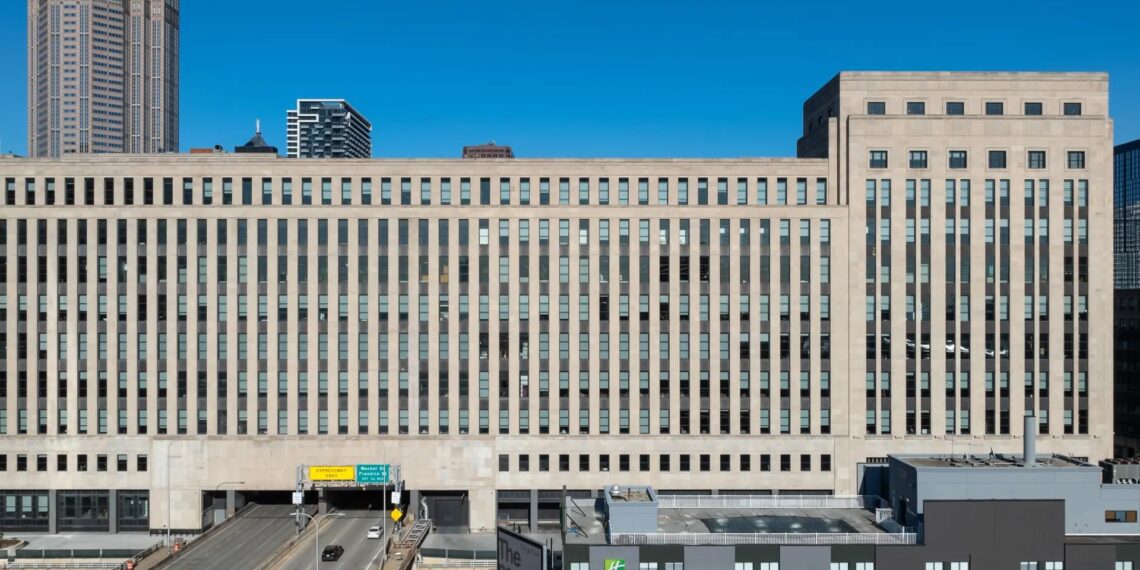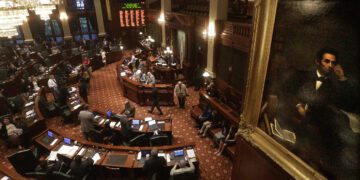By Illinois Review
Walgreens, one of Illinois’ most iconic companies, is the latest major corporation to abandon downtown Chicago – delivering another blow to Governor J.B. Pritzker and Mayor Brandon Johnson’s claim that the city is safe and open for business.
The Deerfield-based pharmacy chain announced this week it will vacate its massive 200,000-square-foot office space inside Chicago’s Old Post Office, a redevelopment once hailed as proof of the city’s comeback. Instead, Walgreens plans to move back to the suburbs in January 2026, nearly seven years before its lease expires in 2032.
At its peak, the office housed 1,800 employees, serving as a corporate hub for operations and tech teams. But in a city now defined by retail theft, carjackings, and homelessness, downtown has become unrecognizable.

This move follows a familiar pattern. In the past two years, Boeing, Caterpillar, Tyson Foods, and Citadel have all fled Chicago or Illinois entirely – citing high taxes, unsafe streets, and an anti-business environment. Walgreens’ decision shows even local, historic companies are no longer willing to risk it.
While Mayor Johnson insists downtown is “vibrant and thriving,” police reports tell a different story. Violent crime is still a major issue, and carjackings and robberies continue to plague the Loop and West Loop – precisely where companies like Walgreens tried to attract young professionals.
Chicago now leads the nation in murders and shootings for the 13th consecutive year. It also leads in the number of school-age children murdered or wounded by gunfire and in mass shootings – defined as three or more people shot. So far this year, there have been 55 mass shootings in the city.
Chicago’s murder rate is five times higher than New York’s and three times higher than Los Angeles. That’s not a perception problem – it’s a public safety crisis.
Gov. Pritzker and Mayor Johnson continue to blame President Trump and “right-wing fearmongering” for the city’s image problem. But companies aren’t listening to press releases – they’re responding to reality. Johnson cut millions from police overtime budgets while championing “violence interrupters” instead of traditional law enforcement. Pritzker’s SAFE-T Act, which abolished cash bail, has allowed repeat offenders back on the streets within days.
The result is a business climate defined by fear. Downtown retailers have boarded up windows, hired private security, and shortened store hours. Small businesses can’t survive; large corporations won’t stay.
Walgreens’ departure is particularly symbolic. Founded on Chicago’s South Side in 1901, the company once embodied Illinois pride. Its decision to leave downtown now sends a clear message: even hometown employers no longer trust the city’s leadership.
The exodus is accelerating. Citadel moved to Miami. Boeing to Virginia. Caterpillar to Texas. Tyson closed its Chicago-area offices altogether. Each move chips away at the city’s tax base, jobs, and credibility – and each one exposes the failure of Democrat leadership that prioritizes politics over public safety.
Mayor Johnson calls critics “racist” and “fearmongers,” but it’s working families and taxpayers who pay the price. When businesses leave, so do jobs, revenue, and opportunity. What’s left behind are boarded-up storefronts and a shrinking middle class.
Walgreens’ exit is not just a corporate decision – it’s a warning. A city that refuses to confront crime and lawlessness cannot sustain growth.
Illinois families and workers deserve leaders who make public safety – not ideology – the priority. As Walgreens packs its boxes and leaves the Loop, it’s clear Chicago’s decline isn’t about bad luck. It’s about bad leadership.









